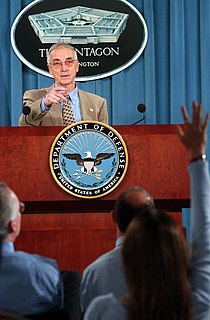Related Research Articles
A loaded question or complex question is a question that contains a controversial assumption.
Pragmatics is a subfield of linguistics and semiotics that studies how context contributes to meaning. Pragmatics encompasses speech act theory, conversational implicature talk in interaction and other approaches to language behavior in philosophy, sociology, linguistics and anthropology. Unlike semantics, which examines meaning that is conventional or "coded" in a given language, pragmatics studies how the transmission of meaning depends not only on structural and linguistic knowledge of the speaker and listener but also on the context of the utterance, any pre-existing knowledge about those involved, the inferred intent of the speaker, and other factors. In that respect, pragmatics explains how language users are able to overcome apparent ambiguity since meaning relies on the manner, place, time, etc. of an utterance.

Exclusive or or exclusive disjunction is a logical operation that is true if and only if its arguments differ.
Stylistics, a branch of applied linguistics, is the study and interpretation of texts of all types and/or spoken language in regard to their linguistic and tonal style, where style is the particular variety of language used by different individuals and/or in different situations or settings. For example, the vernacular, or everyday language may be used among casual friends, whereas more formal language, with respect to grammar, pronunciation or accent, and lexicon or choice of words, is often used in a cover letter and résumé and while speaking during a job interview.

Herbert Paul Grice, usually publishing under the name H. P. Grice, H. Paul Grice, or Paul Grice, was a British philosopher of language. He is best known for his theory of implicature and the cooperative principle, which became foundational concepts in the linguistic field of pragmatics. His work on meaning has also influenced the philosophical study of semantics.
An implicature is something the speaker suggests or implies with an utterance, even though it is not literally expressed. Implicatures can aid in communicating more efficiently than by explicitly saying everything we want to communicate. This phenomenon is part of pragmatics, a subdiscipline of linguistics. The philosopher H. P. Grice coined the term in 1975. Grice distinguished conversational implicatures, which arise because speakers are expected to respect general rules of conversation, and conventional ones, which are tied to certain words such as "but" or "therefore". Take for example the following exchange:

A question is an utterance which typically functions as a request for information, which is expected to be provided in the form of an answer. Questions can thus be understood as a kind of illocutionary act in the field of pragmatics or as special kinds of propositions in frameworks of formal semantics such as alternative semantics or inquisitive semantics. Questions are often conflated with interrogatives, which are the grammatical forms typically used to achieve them. Rhetorical questions, for example, are interrogative in form but may not be considered true questions as they aren't expected to be answered. Conversely, non-interrogative grammatical structures may be considered questions as in the case of the imperative sentence "tell me your name."
In semiotics, linguistics, anthropology and philosophy of language, indexicality is the phenomenon of a sign pointing to some object in the context in which it occurs. A sign that signifies indexically is called an index or, in philosophy, an indexical.
In linguistics, anaphora is the use of an expression whose interpretation depends upon another expression in context. In a narrower sense, anaphora is the use of an expression that depends specifically upon an antecedent expression and thus is contrasted with cataphora, which is the use of an expression that depends upon a postcedent expression. The anaphoric (referring) term is called an anaphor. For example, in the sentence Sally arrived, but nobody saw her, the pronoun her is an anaphor, referring back to the antecedent Sally. In the sentence Before her arrival, nobody saw Sally, the pronoun her refers forward to the postcedent Sally, so her is now a cataphor. Usually, an anaphoric expression is a proform or some other kind of deictic (contextually-dependent) expression. Both anaphora and cataphora are species of endophora, referring to something mentioned elsewhere in a dialog or text.
In linguistics, focus is a grammatical category that conveys which part of the sentence contributes new, non-derivable, or contrastive information. In the English sentence "Mary only insulted BILL", focus is expressed prosodically by a pitch accent on "Bill" which identifies him as the only person Mary insulted. By contrast, in the sentence "Mary only INSULTED Bill", the verb "insult" is focused and thus expresses that Mary performed no other actions towards Bill. Focus is a cross-linguistic phenomenon and a major topic in linguistics. Research on focus spans numerous subfields including phonetics, syntax, semantics, pragmatics, and sociolinguistics.
In social science generally and linguistics specifically, the cooperative principle describes how people achieve effective conversational communication in common social situations—that is, how listeners and speakers act cooperatively and mutually accept one another to be understood in a particular way. As phrased by Paul Grice, who introduced it in his pragmatic theory,
Make your contribution such as is required, at the stage at which it occurs, by the accepted purpose or direction of the talk exchange in which you are engaged.
In the branch of linguistics known as pragmatics, a presupposition is an implicit assumption about the world or background belief relating to an utterance whose truth is taken for granted in discourse. Examples of presuppositions include:

Relevance theory is a framework for understanding utterance interpretation first proposed by Dan Sperber and Deirdre Wilson and used within cognitive linguistics and pragmatics. It was originally inspired by the work of H. Paul Grice and developed out of his ideas, but has since become a pragmatic framework in its own right. The seminal book, Relevance, was first published in 1986 and revised in 1995. The impact of their work is seen by the fact that Google Scholar lists over 24,000 citations of this book.
According to Geoffrey Leech, there is a politeness principle with conversational maxims similar to those formulated by Paul Grice. He lists six maxims: tact, generosity, approbation, modesty, agreement, and sympathy. The first and second form a pair, as do the third and the fourth. These maxims vary from culture to culture: what may be considered polite in one culture may be strange or downright rude in another.
In pragmatics, scalar implicature, or quantity implicature, is an implicature that attributes an implicit meaning beyond the explicit or literal meaning of an utterance, and which suggests that the utterer had a reason for not using a more informative or stronger term on the same scale. The choice of the weaker characterization suggests that, as far as the speaker knows, none of the stronger characterizations in the scale holds. This is commonly seen in the use of 'some' to suggest the meaning 'not all', even though 'some' is logically consistent with 'all'. If Bill says 'I have some of my money in cash', this utterance suggests to a hearer that Bill does not have all his money in cash.
Explicature is a technical term in pragmatics, the branch of linguistics that concerns the meaning given to an utterance by its context. The explicatures of a sentence are what is explicitly said, often supplemented with contextual information. They contrast with implicatures, the information that the speaker conveys without actually stating it.
In linguistics, veridicality is a semantic or grammatical assertion of the truth of an utterance.
François Recanati is a French analytic philosopher and research fellow at the Centre National de la Recherche Scientifique. Many of his works focus on the philosophy of language and mind.
Experimental pragmatics is an academic area that uses experiments to test theories about the way people understand utterances—and, by extension, one another—in context.
In formal semantics, a Hurford disjunction is a disjunction in which one of the disjuncts entails the other. The concept was first identified by British linguist James Hurford. The sentence "Mary is in the Netherlands or she is in Amsterdam" is an example of a Hurford disjunction since one cannot be in Amsterdam without being in the Netherlands. Other examples are shown below:
- #Tamina saw a Beatle or Paul McCartney.
- #The number I'm thinking of is divisible by 4 or it's even.
- #Is Wilbur a pig or an animal?
References
- ↑ Levinson, Stephen C. (1983). Pragmatics . Cambridge Textbooks in Linguistics. Cambridge: Cambridge University Press. ISBN 0-521-22235-4.
- ↑ Grice, H.P. (1978). "Further Notes on Logic and Conversation," Syntax and Semantics, vol.9 edited by P. Cole, Academic Press. Reprinted as ch.3 of Grice 1989, 41–57.